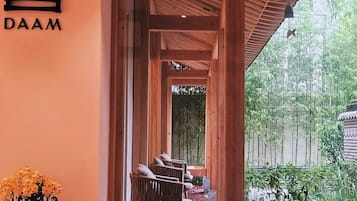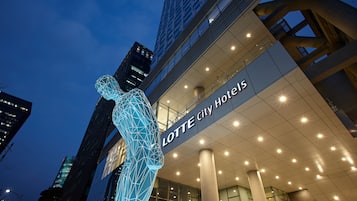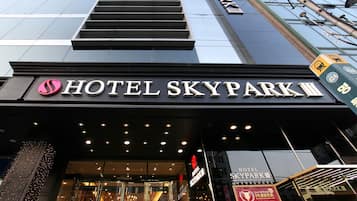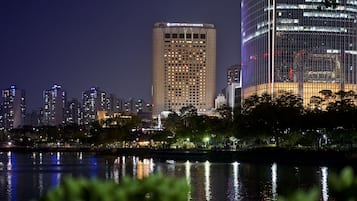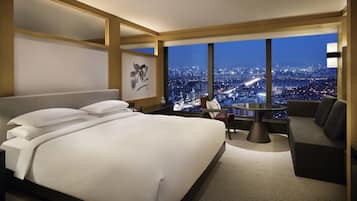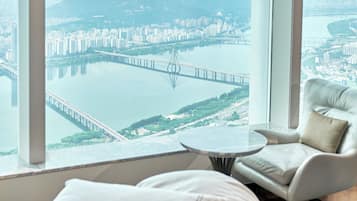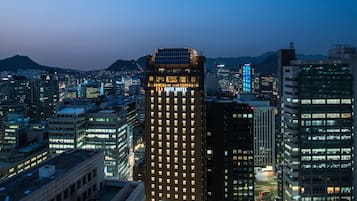Iconic buildings and places in Seoul are where you can feel the history of the city, which has been the capital of South Korea over a long period of time. With its proud culture, lifestyle, and nature, this modern landscape has plenty of historical sites worth visiting during your trip.
Gyeongbokgung Palace showcases the 500-year history of Joseon Dynasty, while Changdeokgung Palace is a UNESCO World Heritage site in Seoul. You can also find many royal residences that keep the history of the Joseon Dynasty during its final years within their walls. While Myeong-dong is widely known as the city’s shopping hub, it also hosts the Myeongdong Cathedral, which is a symbol of Korea's contemporary history. Of course, no visit to Seoul is complete without exploring its traditional villages, where museums and workshops let you learn about traditional Korean culture and experience a timeless vibe in the middle of a modern city.
- 1
Deoksugung Palace
Harmony between traditional and modern architectural styles

- Pör
- Fjölskyldur
- Sögu
- Myndatökur
Located in the heart of Seoul, Deoksugung Palace offers the chance for you to come face to face with an architectural style that combines “antique” and “modern.” It is said that the palace was renamed from Gyeongungung to Deoksugung based on the wish for the long life of Emperor Gojong, the 26th ruler of Joseon and the first emperor of the Daehan Empire. As you walk past Daehanmun Gate, the main entrance to the palace, you will find grand, traditional wooden structures as well as Western-style stone buildings, which were built in the late Joseon Dynasty period, arranged in a neat, cohesive manner. Structures in Deoksugung include Junghwajeon, the centre of the palace; Hamnyeongjeon, the royal bedroom; and Romanesque Jeonggwanheon where Emperor Gojong often held feasts. Seokjojeon, located behind Junghwajeon, is a three-story European neoclassical stone structure built in 1909. The first floor was used as the reception area for Emperor Gojong. Today, the Daehan Empire History Museum is housed in the main wing of Seokjojeon while the National Museum of Modern and Contemporary Art occupies the west wing.
Visit the Daehan Empire History Museum and the National Museum of Modern and Contemporary Art and check out various exhibits to witness history and culture at the same time. Make sure to take a stroll along romantic Deoksugung Doldam-gil with your family and loved ones.
Staðsetning: 99, Sejong-daero, Jung-gu, Seoul, Republic of Korea
Opnunartími: Tuesday–Sunday from 9 am to 9 pm (closed on Mondays)
Símanúmer: +82 (0)2-771-9951
Kort - 2
Namsangol Hanok Village
A place to witness and enjoy 600 years of history and culture

- Ódýrt
- Pör
- Fjölskyldur
- Sögu
- Myndatökur
Take a trip to Namsangol Hanok Village to experience the lifestyle of ancestors up close. The hanok village located in Namsangol Park was established in 1994 in commemoration of the 600th anniversary of Seoul’s foundation as Korea’s capital. You can engage in a variety of traditional activities from cultural experiences such as wearing hanbok, folding hanji, writing Hangul and drinking traditional tea to an etiquette class and oriental medicine experience. Namsangol Park is also home to the Traditional Craft Exhibition, Namsan Gugakdang, Cheonugak and Time Capsule Square, offering a panoramic, picturesque view of downtown Seoul.
After watching Taekwondo and straw crafts demonstrations, try your hand at some traditional games like jegichagi and yutnori and then enjoy a cup of traditional tea or coffee at Cafe 1890. On weekends, traditional wedding ceremonies are held in the village, and whether you are an onlooker or actually participate, it will be a special experience. Traditional cultural heritage commentators will provide you with friendly commentary.
Staðsetning: 28, Toegye-ro 34-gil, Jung-gu, Seoul, Republic of Korea
Opnunartími: Tuesday–Sunday from 9 am to 6 pm (closed on Mondays)
Símanúmer: +82 (0)2-2261-0517
Kort - 3
Gyeongbokgung Palace
Where you can find traces of the Joseon Dynasty
- Pör
- Fjölskyldur
- Sögu
- Myndatökur
Lesa meiraDisplaying both magnificence and class, Gyeongbokgung was the main royal palace of the Joseon Dynasty. The palace is also called Bukgwol as it is located in the northern part of Seoul. Among the five royal palaces, Gyeongbokgung holds the greatest architectural beauty. As you walk past Gwanghwamun and Heungnyemun Gates and arrive at Geunjeongjeon Hall, you will get a spectacular view of the grand Bugaksan Mountain over the palace. The ponds of Gyeonghoeru and Hyangwonjeong Pavilions, two of the most famous Joseon structures, still remain in their original forms, from which you can feel the charm of an ancient palace. In addition, you can check out the history of the nation at the National Folk Museum and the National Palace Museum.
Those who rent and wear beautiful hanbok may enter the palace for free. Walking through the royal palace in Joseon attire and taking memorable photos will truly be an unforgettable experience.
Staðsetning: 161, Sajik-ro, Jongno-gu, Seoul, Republic of Korea
Opnunartími: Wednesday–Monday from 9 am to 6 pm (closed on Tuesdays)
Símanúmer: +82 (0)2-3700-3900
Kort - 4
Dongmyo Shrine
Harmony between exotic architecture and flea market

- Pör
- Fjölskyldur
- Sögu
- Myndatökur
- Verslun
In Dongmyo, you are able to encounter traces of a long history and hidden gems that you can’t normally find. The place was built based on a request from the Ming Dynasty, which helped Joseon fight against the Japanese during the Imjin War, to build a shrine for Guan Yu from the Romance of the Three Kingdoms. An element of Chinese architecture is shown through two buildings attached along with Joseon’s charm.
Located near Dongmyo Shrine, Dongmyo Flea Market houses over 1,000 shops, making it one of the two largest marketplaces for used goods along with Hwanghak-dong Flea Market. People say that the market has everything in the world except those that are brand-new. You can purchase all kinds of used goods from various ornaments and antiques to electronics, cameras, books and clothes. Countless foreign tourists also visit this folk flea market so do not miss out on the opportunity to purchase special items at low prices.
Staðsetning: 84, Nangye-ro 27-gil, Jongno-gu, Seoul, Republic of Korea
Símanúmer: +82 (0)2-2148-4167
Kortmynd frá Steve46814 (CC BY-SA 3.0) breytt
- 5
Changgyeonggung Palace
A palace of simple beauty and relaxing atmosphere

- Pör
- Fjölskyldur
- Sögu
- Myndatökur
Exuding elegance and tranquillity, Changgyeonggung Palace serves as a resting place for Seoul citizens. King Taejong resided at this palace after his abdication. Although this is neither the main palace used as the residence for the king nor where political affairs were held, it is still one of the five royal palaces and served an important administrative function. Disgraced during the Japanese colonial era when the palace was converted into a zoo, botanical garden, museum and amusement park, it was restored as a royal palace in the 1980s. Honghwamun, the main entrance, and Myeongjeongjeon, the inner hall, are not as grand as those of Gyeongbokgung but are still neatly and elaborately decorated while the quiet and tranquil promenade is perfect for healing in the city.
During the nighttime viewing period from April to November, you can witness the beauty and comfort of an old royal palace under spectacular lights. We also recommend visiting Insa-dong Café Street located close to the palace.
Staðsetning: 185, Changgyeonggung-ro, Jongno-gu, Seoul, Republic of Korea
Opnunartími: Tuesday–Sunday from 9 am to 5.30 pm (closed on Mondays)
Símanúmer: +82 (0)2-762-4868
Kort - 6
Jogyesa Temple
A landmark of Korean Buddhism found in the city

- Pör
- Fjölskyldur
- Sögu
- Myndatökur
Jogyesa Temple is the headquarters of the Mahayana Jogye Order that seeks a world where all living things live in harmony. As you walk past the main gate, Iljumun, and Sadaecheonwang Bujosang and enter the precincts, you will realize that it is a place of asceticism, culture and history. When you look at Daeungjeon Hall, an intangible cultural heritage of Seoul, together with Samjonbul, 500-year-old lacebark pines and locust trees, you can’t help but have a humble heart. You can see the aesthetic sense and harmony of ancestors even from the Daeungjeon eaves.
The precincts are open 24 hours a day so come by whenever you want and look around the beautiful and charming ancient temple. In particular, the magnificent night view of the temple makes the entire scene glow brighter in the dark. We also recommend you to participate in the temple stay program to find healing of the mind fatigued from daily life and to attain peace and wisdom.
Staðsetning: 55, Ujeongguk-ro, Jongno-gu, Seoul, Republic of Korea
Símanúmer: +82 (0)2-768-8600
Kort - 7
Changdeokgung Palace
A nature-friendly royal palace and rear garden
- Pör
- Fjölskyldur
- Sögu
- Myndatökur
Lesa meiraAt Changdeokgung, the second royal palace of Joseon, you can encounter architectural styles in harmony with the natural landscape as well as a beautiful rear garden. Designated as a UNESCO World Heritage Site, the palace is considered an epitome of complete architecture as its buildings are nestled in the forest along the natural mountain terrain. The rear garden, also known as Huwon Secret Garden, was created for banquets, strolls and learning, and is connected to Changgyeonggung. Since this royal palace was the primary residence of kings for the longest period with facilities such as ponds and pavilions forming harmony with nature including huge 300-year-old trees, the palace holds immense architectural value.
At Changdeokgung, step away from your hectic daily life and take a slow walk around the palace to feel and enjoy nature. We recommend you to dive deeper into the beauty of Huwon and check out nearby Changgyeonggung.
Staðsetning: 99, Yulgok-ro, Jongno-gu, Seoul, Republic of Korea
Opnunartími: Tuesday–Sunday from 9 am to 5 pm (closed on Mondays)
Símanúmer: +82 (0)2-762-8261
Kort - 8
Sungnyemun Gate
National Treasure No. 1 in Seoul

- Ódýrt
- Pör
- Fjölskyldur
- Sögu
- Myndatökur
- Verslun
Sungnyemun Gate, National Treasure No. 1, has protected the nation’s capital for a long period of time. The gate has been serving as the guard gate of Hanyang, the capital of Joseon, for some 600 years. Sadly, the gate was burned down to ashes in 2008 despite having been well preserved even during the Japanese colonial era. Fortunately, though, the gate was restored completely to its original form in 2013 thanks to thorough historical research.
At the time, only the front gate was opened in order to protect the restored Sungnyemun and for people’s safety. Starting in June 2021, the rear gate was also opened to alleviate traffic inconveniences experienced by citizens. Namdaemun Market is one of the largest wholesale markets in Seoul along with Dongdaemun Market featuring over 10,000 stores selling clothes, accessories and various living supplies. Stop by and enjoy shopping for quality products at reasonable prices.
Staðsetning: 40, Sejong-daero, Jung-gu, Seoul, Republic of Korea
Opnunartími: Tuesday–Sunday from noon to midnight (closed on Mondays)
Símanúmer: +82 (0)2-779-8547
Kort - 9
Bukchon Hanok Village
Experience course to enjoy traditional homes with 600 years of history
- Pör
- Fjölskyldur
- Sögu
- Myndatökur
Lesa meiraBukchon Hanok Village is located in between Gyeongbokgung Palace, Changdeokgung Palace and Jongmyo Shrine, and, because of the stunning surrounding scenery, it was once a luxurious residential area where the royal family and high officials of Joseon lived. The area was named Bukchon due to its location north of Cheonggyecheon Stream and Jongno. It is a traditional hanok village that still preserves the appearance of 600-year-old Seoul and features a traditional cultural experience centre and hanok restaurants, which make you feel as if you are back in Joseon.
The Eight Scenic Views of Bukchon course allows you to check out the famous attractions of Bukchon. The tour starts at Bukchon Traditional Culture Centre and gives you the chance to savour the unique mood of Bukchon Hanok Village. In particular, we recommend you to visit Kokdurang Hanok, which is the 6th Scenic View. After completing the scenic view tour, make sure to try some traditional dishes such as seolleongtang, hanjeongsik and mandu jeongol at one of the delicious restaurants in Bukchon.
Staðsetning: 37, Gyedong-gil, Jongno-gu, Seoul, Republic of Korea
Opnunartími: Daily from 9 am to 6 pm
Símanúmer: +82 (0)2-2133-1371
Kort - 10
Myeongdong Cathedral
Symbol of Catholicism with a long history

- Ódýrt
- Pör
- Fjölskyldur
- Sögu
- Myndatökur
At Myeongdong Cathedral, you can witness the history of the Catholic Church and stand in awe of its excellent architecture. The official name of the cathedral is the Myeongdong Catholic Cathedral Archdiocese of Seoul. Considered the symbol and heart of the Korean Catholic Church, Myeongdong Cathedral enshrines the remains of numerous martyrs. The Catholic Church in Korea was founded by Koreans themselves, something that was unprecedented in the 2000-year history of Catholicism. Completed after 12 years of construction, Myeongdong Cathedral is a pure Gothic-style structure designated as a Historic site thanks to its immense cultural value.
The Archdiocese of Seoul Office, Catholic Hall and St. Paul’s Catholic Center are located nearby. Mass takes place both on Sundays and weekdays. Due to demand, soon-to-wed couples typically have to wait about a year to wed at the church.
Staðsetning: 74, Myeongdong-gil, Jung-gu, Seoul, Republic of Korea
Símanúmer: +82 (0)2-774-1784
Kort







